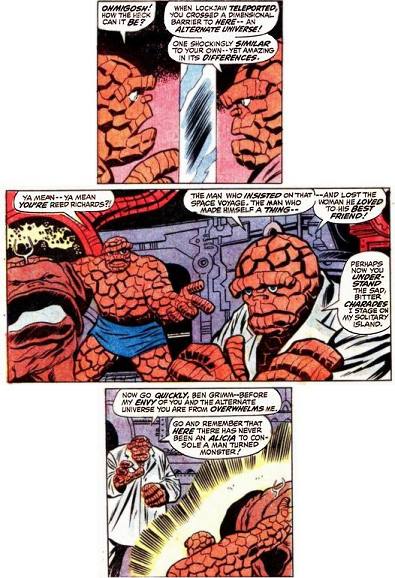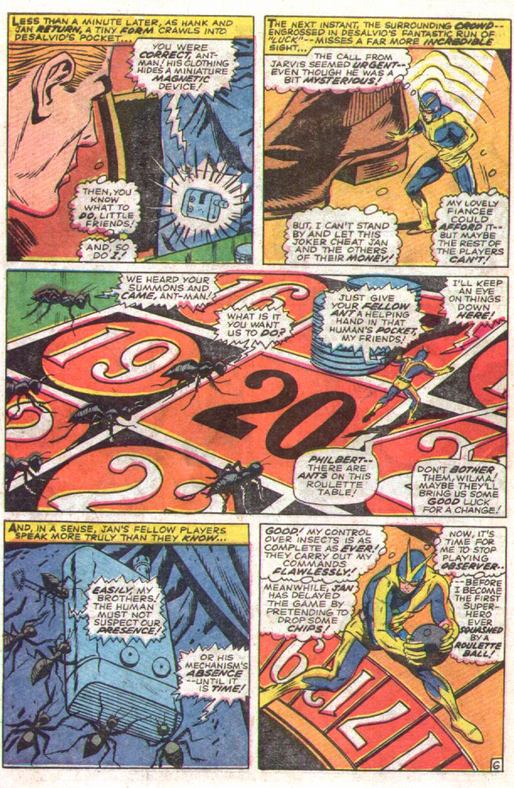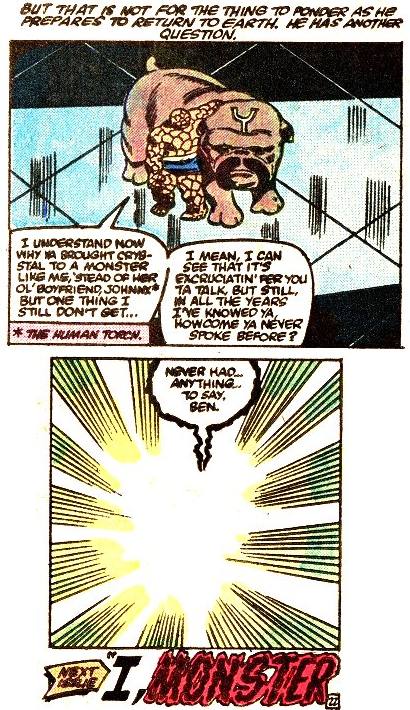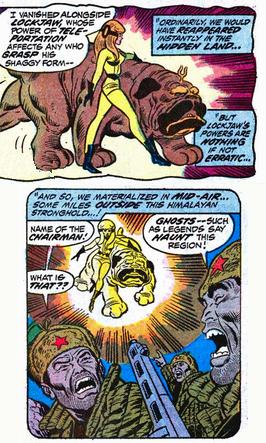|
|
||||||||||||||||||||
 |
|
|
 |
And judging from the size of his skull, Lockjaw's brain is physically larger than any human's.
So we can conclude that Lockjaw has one of the planet's most powerful brains. Although much of this power is no doubt unconscious.
Apart from his unique mental abilities, Lockjaw also shows general intelligence. Right from the start, Lockjaw has always demonstrated the unique signs of human intelligence: tool use, problem solving, high level empathy, and language skills.
Most important, when judged by results, Lockjaw is smarter than most humans. He arranges rescues, outwits super-villains, disables high tech battle suits, and more. He doesn't brag about it. He is happy to just hang around his friends and have fun. But where intelligence is concerned he lets his actions do the talking.
Tool use
Lockjaw understands and uses tools. In his first appearance, the Inhumans' hideout had been reduced to rubble, but Lockjaw probes for the door and open it telekinetically. Think about how complex this process must be. A lock is basically a puzzle, and the key is the solution. Without a key, Lockjaw's brain reaches out, understands the complex process, and solves the puzzle. This is typical of his ability to manipulate his environment.
In the next issue, Lockjaw decides (without being told) to use a girder as a very effective tool.

But his understanding goes beyond simple tools and girders. When he visited the FF's hideout, he recognized that one of the many electronic devices was used for communication, he deduced that there was an incoming message, and he alerted the others. The others had not noticed - maybe they are less intelligent than Lockjaw? Johnny in particular was acting the fool. Who showed the most intelligence here? Critics might say he was just reacting to a 'ka-thak' noise, but that is highly unlikely: the 'just a dog' theory requires Lockjaw to be highly trained for times of war, so he would not react to minor distractions any more than would a highly trained war horse.
A recent Lockjaw story contains another good example of using tools. Ben was being attacked by a man in a high voltage suit. Ben could not see how to defeat him, but Lockjaw could. Lockjaw worked out how the man's suit worked, which part of it would be safe to touch, and with one swift movement disabled the suit. Many other Lockjaw stories show similar skills
Time and again lockjaw understands language and uses tools. Lockjaw's brain can also compute problems that no human could even attempt, as we shall see in the next section.
Pandimensional tracking
Lockjaw has a power that Reed (and everyone else) would love to duplicate - it would save endless time, cost, and danger. Reed has access to plenty of equipment for analyzing physical and biological states. Given Reed's access to advanced alien technology, duplicating any physical structure would be relatively easy. Yet nobody has duplicated Lockjaw's ability. Why? think about it:
An ordinary dog can track the scent of people who are present
Lockjaw can track people who are not present.
An ordinary dog has to choose between hundreds of scents
Lockjaw has to distinguish between billions of people, multiplied by countless worlds, multiplied by countless alternate realities, plus endless other dimensions
Lockjaw's brain power must be simply vast, unimaginable. Even if his abilities were no greater than sniffing out, his brain would need to be so enormous that just being able to speak would only take a fraction of a hundredth of one percent of his abilities. His mind is usually on greater things.
A critic might argue that maybe the universe is arranged so as to make this task easy. Well easy it ain't. If Lockjaw isn't careful he can easily go to the wrong place, or even materialize in midair. Crystal once noted that, if he is distracted when teleporting, he can end up in the wrong place. Clearly, teleportation is a very difficult skill. That is the simplest explanation of why nobody has been able to duplicate his power.
High level empathy - real frontal lobe stuff
Lockjaw's understanding of psychology goes beyond anything an animal could have. For example, in the second story in FF 118, he rescues Ben, then takes him to an alternate dimension. Are we to assume that he chose this dimension by accident? Of all the infinite worlds, Lockjaw chooses the one that has a message for Ben. It seems that Lockjaw understands Ben's tragedy, and understands Ben's feelings towards Reed, and wants to show him the other side of the coin.

How much proof do we need? Lockjaw shows more evidence of intelligence than many regular people who appear in comics. How high must we raise the bar before we admit the obvious?
But perhaps Lockjaw was showing something more when he took Ben to that parallel world: that he understands being trapped in an ugly body, being misunderstood by everyone. And he is telling Ben to count his blessings - Ben has Alicia, just as Lockjaw has the royal family. In this light, the later revelation, that Ben and Lockjaw are not so different - makes everything fall into place.
Language skills
In his first appearance, Crystal tells Johnny that she needs to return home. Lockjaw understands the conversation, even though Crystal is not talking to him. and solves the problem. There is no evidence that he was commanded to do so, or that he was trained to do so. This happens all the time - he understands language, and this shows intelligence. But maybe he is just an unusually intelligent dog? Keep reading...

Lockjaw does not just recognize familiar words from his friends - a dog could do that. Lockjaw recognizes unfamiliar words from strangers as well. For example, in issue 118 where Diablo says that Lockjaw will take him to the place where the revolutionaries gather, this is a complex sentence concerning unfamiliar events in unfamiliar places, given by an unfamiliar master. Most humans would find that a challenge, and even the most well trained dog would find it impossible. But Lockjaw understands immediately and obeys.
Why does it matter if Lockjaw can talk?
The question "Does Lockjaw talk?" is philosophical (should animals be treated like humans?) and moral (should we judge by appearances?). It gets to the heart of human prejudices.
Everyone agrees that Lockjaw has shown great intelligence and, by fighting for the right, morality. Yet many people at Marvel feel that it was wrong that Byrne showed Lockjaw talking (in The Thing, volume 1, issue 3).
I am perfectly happy with Lockjaw being called a dog - he looks like a dog, he sniffs, he barks, he enjoys doglike things. And I am neutral about whether he was human (or inhuman) before. Maybe the Terrigen mists were tried on some other life form, and his "even me" question to Quicksilver only implied that the mists can make very drastic changes to any physiology.
What matters to me, and why I made this web site, is a gut feeling of justice. If he has human level intelligence and human level morality, then he is equal to a human. In that case, whether he speaks or not is a trivial point. If Byrne said that he once spoke, then this is interesting but does not change anything fundamental, so I don't see the need to retcon what was a great story.
What difference does it make that Lockjaw is called a dog or a human or a fish or a cabbage? Why does it matter if he likes to lick and sniff and bark and so on? All that matters is his intelligence and morality. That makes him the equal of any human, so speaking or not is just his personal preference. That was the original Cynic philosophy (before the word got twisted to mean something different.) All that matters is virtue. We should never treat someone as inferior just because they are different.
If we say "he cannot speak because he is a dog!" then we speak from blind prejudice. This web site is an attack on prejudice.
Talking is trivial
In the Marvel Universe even ants can talk. So can squirrels (see Squirrel Girl) and no doubt others if only we could understand their language. It's no big deal. Here are some ants talking to Ant Man, from Avengers 46:
 |
So even if we completely ignore John Byrne's famous issue, obviously Lockjaw can talk. The reason he doesn't usually talk is probably the same as the reason that ants don't usually talk: they are not built for human language. The only time we know of when Lockjaw managed to make human sounds, The Thing observed that it was very painful for him - it was "excruciating." Presumably he used his teleporting powers to manipulate the air or his throat in an awkward and painful way.
“But the ants don’t really talk, Ant Man’s helmet interprets their brain waves”
The example above shows that they have at least some intelligence. But maybe when animals “speak” it’s really just a brain wave thing? Maybe so. That would explain the antenna on Lockjaw’s head. And it would explain why his speech balloon looks weird. The key point is that we see from his adventures that he acts jst as intelligent as any human, so the ability to talk is trivial.
He speaks!
In The Thing issue 3, written by John Byrne, we learn that Lockjaw can speak:
 |

Above: the last two panels of The Thing (first series) issue 3. Courtesy of
When I learned Lockjaw's origin, in The Thing issue 3, like Ben Grimm I was surprised. But as Ben Grimm said, it explained everything that went before: "Somehow, looking at the fish-man, Triton, the only half-human Gorgon, the mad myriad of forms the Inhumans take... somehow it seemed only logical." Here is the commentary on that issue, courtesy of The Ever-Lovin' Blue-Eyed Home Page!
Issue 3. Okay, time to go off a little bit. This is a wonderful issue. Quicksilver, who has always been something of a bigot, has had a daughter, Luna, through his marriage to the Inhuman Crystal. The merging of Inhuman and mutant genes produced a strictly human daughter, and Quicksilver wants to mutate her through exposure to the Inhumans' Terrigen Mists. By Inhuman law, this is the father's decision, and as Crystal opposes it, she seeks Ben's help. Very dramatic setup, very personal storyline, wonderfully told. It all comes to a head when, in the middle of the battle, Lockjaw, who for years has been perceived as the Inhumans' pet, speaks one whole line of dialog, revealing that he is sentient and an Inhuman who's gone through the Terrigen Mist, forcing Quicksilver to realize how drastically his daughter could be changed. Lockjaw doesn't ever speak again, save one line of dialog as he and Ben teleport away alone at the end. Beautiful, moving, touching story, very well done, probably my vote as the single best thing Byrne has written at Marvel.
Cut to, eight few years later, X-Factor #71. Lockjaw and Quicksilver meet up with Jamie Madrox (the Multiple Man), who then tries to talk to Lockjaw. Quicksilver then laughs at him and tells him that Lockjaw's "talking" was a practical joke played upon Ben Grimm by Gorgon and Karnak.
Here are Peter David's comments on the issue, from PeterDavid.net: "For what it's worth, I didn't give a damn about the Byrne story one way or the other. I thought it wasn't bad; not great, but not bad. It did, however, frost the flakes of several writers and the "X-Factor" editor, basically because Byrne's story made the Inhumans look like assholes. John Byrne, foremost advocate of adhering to creator intent, ignored not only sequences where Stan and Jack had the Inhumans referring to, and treating, Lockjaw as their pet or dog, but the subsequent decades worth of continuity that did the same. So, since Quicksilver was going to be in "X-Factor," the writers--and the editor in particular--asked me to take the opportunity to undo that development as quickly and simply as I could. I shrugged, said, "Okay, boss," and did so."
And my comments on the issue: The Inhumans don't have pets. Period. I challenge you to go through their various appearances and find where someone has a dog, a cat, even a canary. Why, I couldn't say, but they don't have pets. So why Lockjaw? The knock then is that the Inhumans don't treat Lockjaw as an equal and this makes them out to be "assholes." Yup, I'd tend to agree, save for the simple fact that they're Inhuman. These guys have a long history of acting based on appearance and caste- they're a society built on very different rules from the current mainstream euro-centric society. The Inhumans are not America, and the knock that their actions appear a little, well, inhuman, seems a little egocentric to me. Further, if you start reading through those past issues, he's not actually treated much worse than, say, Gorgon or Karnak are treated by Black Bolt. Finally, the retcon itself is just awful. The reasoning, according to Quicksilver, is that Gorgon and Karnak played a practical joke on Ben while Quicksilver was trying to make a decision which would probably be the most important decision in his daughter's life. Okay, I can accept that Gorgon and Karnak are the kind of, to use the word at hand, "assholes" who would do that at a time like this. But it doesn't work on many levels: Quicksilver, upon learning of it later, would never just laugh it off- "hey, you guys screwed up my daughter's future- pretty funny!". He'd hardly tell it as a funny story months later. While Crystal might quietly accept it to save her daughter, she'd certainly tell Ben the truth in short order. And would Gorgon and Karnak betray the Inhumans to make Crystal feel better? They must have seen literally hundreds of children put through the Terrigen Mists in their day, no? Not to mention Gorgon's having gone through it himself...
In the end, either interpretation has problems and needs help to make it work. I wish Byrne had taken more care with his retcon, or David with his counter-retcon, just so it would make sense either way. Personally, I think Lockjaw as sentient Inhuman makes perfect sense, and that the eternally angry Quicksilver would try to put a different spin on the incident by lying to Madrox makes a lot more sense than Gorgon and Karnak playing "practical jokes" at that time. In the meantime, Lockjaw remains a man of mystery...
The key to understanding Lockjaw's mind
I think we can understand Lockjaw better if we look at the work of Temple Grandin. Temple Grandin is a scientist who studies how animals think, has written many books on the topic, and has improved the lives of millions of animals by designing better ways of treating them. She has a special advantage in this field that other scientists lack: Temple Grandin is autistic. I strongly encourage anyone who wants to know how animals think (whether real or comic book) to read Grandin's books.
First, let us review what we know about Lockjaw's mind, then let us see what Grandin says about how animals think.
Lockjaw shares much in common with a dog
He can speak, yet chooses not to, not even with sign language
He said he "never had anything to say" and yet there were plenty of times when, to a human observer, he could have said something.
He often goes his own way, making decisions that infuriate his human companions.
His mind is able to process the amazingly complicated problem of navigating parallel dimensions.
Now let us see what Grandin says about how animals think (this is just a summary - read her books for the whole picture)
Animals do not think with language - their brains work in a different way. Autism is like half way to that kind of brain.
Autistic people have more direct access to lower level brain functions, which allows them to solve some kinds of problems much faster than regular people.
In particular they can focus on one topic without noticing other things, or they can notice little details that others miss.
Autistic people often don't realize that other people want something from them.
Notice how autistic people can talk Grandin writes books and lectures. But language is not something that comes easily - it isn't how her mind naturally works. I find all of this very enlightening when considering the Lockjaw problem - how can someone be so intelligent yet so infuriating and so animal-like? Perhaps Lockjaw, when previously human, was autistic, and the "teleporting dog" mutation just exaggerated what was always there - his true self. He never spoke before because ti never occurred to him that this was the appropriate thing to do. His mind does not work that way.
Lockjaw the philosopher!
Students of Greek Philosophy may recognize Lockjaw: he has much in common with the Cynic philosophers. "Cynic" is the Greek word for dog. In later centuries, a cynic came to mean anyone who criticized others' motives, but the original cynics were only interested in virtue. They had simple needs and found joy in the simple things in life. Some cynics went to extremes, and rejected every part of sophisticated life (property, money, marriage, etc.) and lived just like their namesakes, dogs.
The Ancient Greek Cynics believed that virtue was the greatest truth, and they didn't care about anything else. They didn't seek wealth or position, they didn't care what people thought of them, and they didn't feel the need to say anything if they didn't want to. Much like Lockjaw. Most people find this hard to understand. How can you not care what others think? How can you be so at peace with yourself? How can you find real joy in the simple act of being alive, rolling, sniffing, running and playing? When you understand that you will have true inner peace, and you will understand Lockjaw.
Surely philosophers have to say things? Surely they must write books? Not always. Many of the greatest philosophers are only known because of what their disciples said. The cynics are the same, and rejected theory in favor of practice. You can tell what Lockjaw thinks by what he does, not by what he says.
At first people treated the cynics like fools. But as people started to pay attention they began to realize that these people had really got it together. These people were centuries ahead of their time. But that was their undoing. People wanted to copy the fun parts (criticizing others and doing their own thing) and ignore the hard parts (living a virtuous life). So the word cynic lost its original high meaning.
To understand Lockjaw the philosophers, it might help to compare other great Cynic philosophers, Diogenes, Crates (pronounced cra- tees) and Antisthenes.
Lockjaw and Diogenes
The most famous cynic was Diogenes. Does any of this sound familiar?
He would introduce himself by saying, "I am Diogenes the dog. I nuzzle the kind, bark at the greedy and bite scoundrels." He'd use a lantern by daylight, explaining that he was searching for an honest man. Even Alexander the Great didn't escape unscathed. When the young conqueror found Diogenes sitting in the marketplace and asked how he could help him, the old philosopher replied that "you can step out of my sunlight." - (source)
Diogenes believed that, to provide a truly alternative way of thinking and living, you must purposefully open yourself up to ridicule from society. Diogenes, like Lockjaw, did not just tolerate being called a dog. He encouraged it!
Lockjaw and Crates, "the door opener"
Lockjaw reminds me of another of these dog-philosophers, Crates (pronounced cra- tees). Crates was often called "the door opener" because he would come and go as he pleased. Like Lockjaw. These words of Crates that could have been spoken by the dimension-hopping Lockjaw himself:
'Tis not one town, nor one poor single house,
That is my country; but in every land
Each city and each dwelling seems to me,
A place for my reception ready made.
(source)
Crates was a very ugly man (source) - Lockjaw would win no prizes in a beauty contest. Yet he is respected and admired. Much like Crates.
As a result of his generally easygoing attitude, he was greatly respected in Athens as a kind and supremely virtuous man. The character of Crates closely resembled the character of an Indian philosopher, Siddhartha Gautama (a.k.a. Buddha). (source)
Come to think of it, Lockjaw with his massive bulk and peaceful expression looks a bit like the Buddha.
Lockjaw and Antisthenes
Antisthenes founded the school of the Cynics. He is best known for having no possessions, except his tatty cloak. Many stories are told about the holes in his cloak. For example, Socrates once met him and said that Antisthenes was not really humble because he ran a school. Socrates said that Antisthenes' vanity shone through the holes in his cloak. Antisthenes did not argue. He closed down his school, became a follower of Socrates (even though he did not agree with all that Socrates taught), and encouraged his former followers to do the same.
The parallels with Lockjaw should be obvious. Lockjaw's tatty cloak is his baggy, ill-fitting skin. Lockjaw clearly has his own views, yet chooses to be seen as just a follower of Black Bolt or Crystal. Above all, Lockjaw does not lecture or preach to anyone. He lets his actions do the talking. He clearly knows a great deal, yet he chooses to follow others.
Lockjaw the enigma
Does Lockjaw support the Inhuman political system? Or does he simply make use of it because it gives him a comfortable life? I think the answer is "both."
Does he embrace his canine side because he likes sniffing and scratching, or is he making a comment about living for the day? I think the answer is "both."
Is he a servant, lacking any freedom, or is he the most free of any creature in the universe, able to come and go anywhere and act as he pleases, unrestrained by normal expectations? I think the answer is "both."
Is he a loner, or is he intensely loyal and always surrounded by friends? I think the answer is "both."
I think that every person on earth would love to have what Lockjaw has. Unrivaled freedom, yet a safe and structured life when he wants it. Friends and admirers everywhere, yet he can be a complete loner. The ability to influence events of galactic importance, yet also the freedom to sniff and roll on the floor and generally do whatever he wants!
Lockjaw the ultimate and greatest superhero and philosopher - we salute you!
Most superheroes have the curse of Spiderman - "with great power comes great responsibility." Even the most powerful beings, like Galactus, are cursed with a fate they never chose, and they must act the role that fate has given them. They are truly slaves. Only Lockjaw is truly free. Lockjaw has great power, and great responsibility - he often saves the world - but he does it on his own terms. If he wants to take a break and go and just enjoy life at any time, he can!
Like the ultimate geek, he does whatever he wants, whenever he wants. Like the ultimate superhero, he has power to get out of any problem and save the world every day. Like the ultimate idol, he is surrounded by those him love him, and has friends wherever he goes. Yet he remains totally unaffected. Lockjaw has greater respect for others than anyone else in the universe. He helps people, but never, never, never tells them what to think.
Finally, despite what I have said here, Lockjaw is still just a regular guy. He makes mistakes. He can get irritated and be inconsistent. He is not super-smart (not a Reed Richards) and he is not super-noble (not a Silver Surfer). He is just an ordinary guy like you and me, but he looks different, has some amazing powers, and has chosen a great philosophy of life. He gives the rest of us hope.
I will leave the last words to Rudyard Kipling. Every line describes Lockjaw:
If you can keep your head when all about you
Are losing theirs and blaming it on you,
If you can trust yourself when all men doubt you
But make allowance for their doubting too,
If you can wait and not be tired by waiting,
Or being lied about, don't deal in lies,
Or being hated, don't give way to hating,
And yet don't look too good, nor talk too wise:
If you can dream--and not make dreams your master,
If you can think--and not make thoughts your aim;
If you can meet with Triumph and Disaster
And treat those two impostors just the same;
If you can bear to hear the truth you've spoken
Twisted by knaves to make a trap for fools,
Or watch the things you gave your life to, broken,
And stoop and build 'em up with worn-out tools:
If you can make one heap of all your winnings
And risk it all on one turn of pitch-and-toss,
And lose, and start again at your beginnings
And never breath a word about your loss;
If you can force your heart and nerve and sinew
To serve your turn long after they are gone,
And so hold on when there is nothing in you
Except the Will which says to them: "Hold on!"
If you can talk with crowds and keep your virtue,
Or walk with kings--nor lose the common touch,
If neither foes nor loving friends can hurt you;
If all men count with you, but none too much,
If you can fill the unforgiving minute
With sixty seconds' worth of distance run,
Yours is the Multiverse and everything that's in it,
And--which is more--you'll be Lockjaw, my son!
In the entire Marvel universe, no living entity has ever succeeded like Lockjaw.
Lockjaw, we salute you!
.
|
[HOME] [Lockjaw] [can he talk?] [adventures] [] [SUPERSCIENCE] [how powers work] [] [REAL TIME] [objections] [examples] [] [GOOD VALUE] [sales figures] [] [other stuff] [badtime books] [OTHER SITES] |

 One of the greatest brains on the planet
One of the greatest brains on the planet



